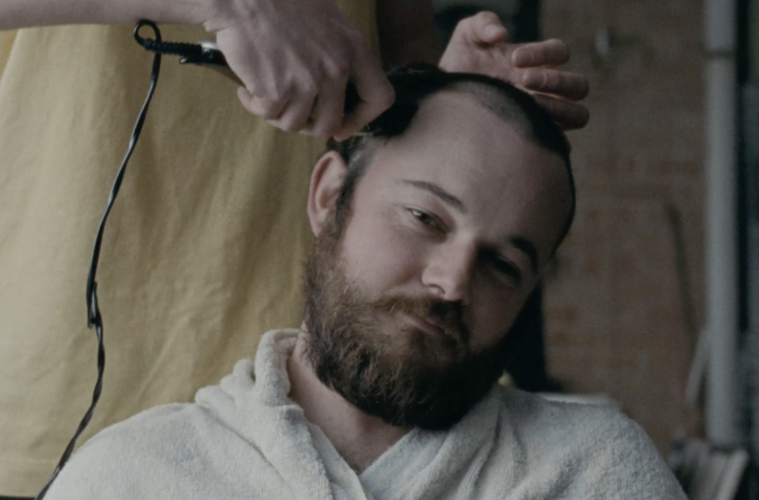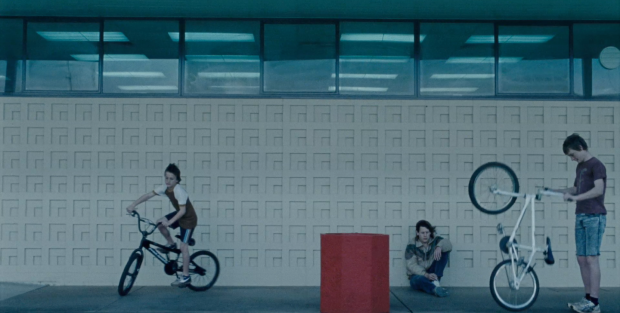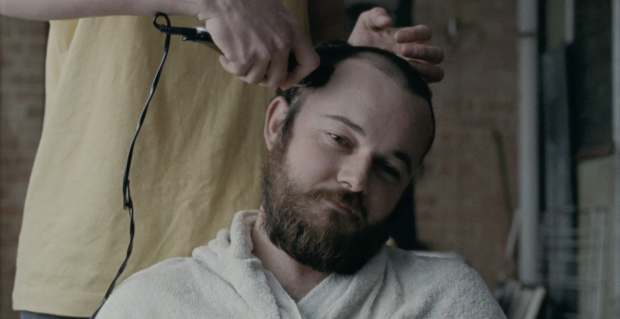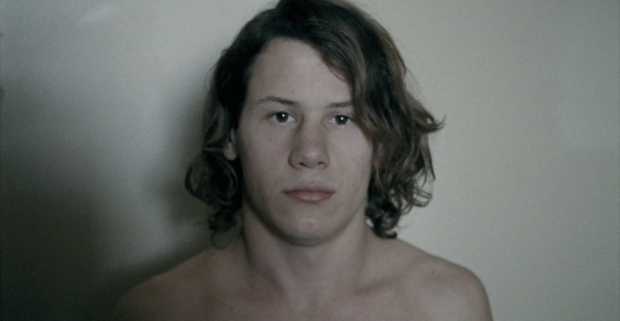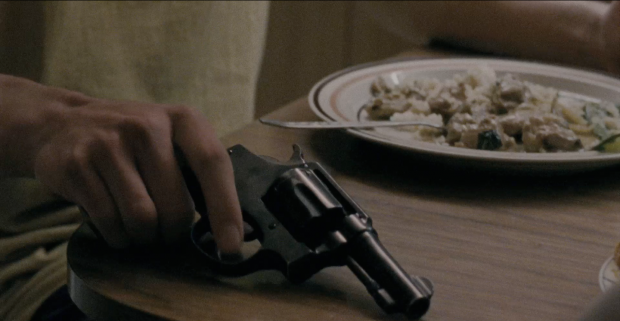I haven’t been able to stop thinking about Justin Kurzel‘s The Snowtown Murders — formerly known, more succinctly, as simply Snowtown — since I saw it three weeks ago, so I was eagerly looking forward to speaking with the filmmaker about his ambitious feature-length debut. We explored a variety of topics in our discussion — the dynamic between professional and non-professional actors, the age-old clichés about serial-killer psychology — and I came out the other end with a buffer, more substantial notion of what impressed me so much about the film.
Kurzel — and well as the screenwriter, Shaun Grant — had a bold notion to communicate the story of Australia’s most violent man through the vessel of a vulnerable, fatherless teenager. It’s a terrifying psychological approach, probably because it’s so eerily identifiable, and in these ways, it draws some parallels to another recent first-time endeavor, Sean Durkin‘s Martha Marcy May Marlene.
Check out the full interview below, and be sure to catch up with our rightfully supportive review of the film.
Before The Snowtown Murders, you were bouncing around a variety of jobs, theater work and music videos among them. How did you go from there to directing a movie about Australia’s most infamous serial killer?
Yeah, well it probably shocked me as much as anyone else. I mean, I wasn’t really clinging to dark films or horror films. I definitely think that I was kind of looking to direct softer [projects] – in fact, some of them were even comedies. I had already had a dialogue with Warp Films in Australia – they set up their offices down there – and we were talking about another film, but that didn’t happen. And then Anna McLeish, the producer, sent me this one, and it’s kind of like, you know, you’re looking [through] the script and you see Snowtown across the front, and there’s no way it could be anything [but] what I thought it was. It’s just one of those words in Australia that you kind of know straight away what it is.
And I was definitely kind of thinking it was going to be a horror film, and I also grew up pretty close to the area, so I knew quite a bit about the area and the community – not a huge amount about the murders, apart from the “bodies in a barrel” kind of tag that it had got, [very] macabre. And then I just started reading it and was pretty blown away by this point of view of this 16-year-old kid [and] this kind of extraordinary relationship between a serial killer/father and this boy. And I had no idea, like many people in Australia, that there was that kind of human side to it. [So] we came up with a vision for it [and] I was pretty scared for a while. I was really trying to find as many different excuses to not do it, but I just couldn’t put the material down. I started reading the books and it had just gotten inside me, so I kind of came back and had a very, very strong vision for it, which was to film down in the area where the murders happened to completely and utterly and 100% focus on Jamie’s point of view, and to obviously use first-time actors predominantly. And I was just really fortunate that the [producers] went, “Okay, yep, let’s do it. This is why we set up Warp Films, to do some sort of brave stuff.” And it was probably about four or five months after that [point] that [we were] actually on set.
The title of the film – and especially the new title, The Snowtown Murders – clues you in as to what the movie is about. But I was interested by the fact that if you went in knowing nothing, you wouldn’t really realize until maybe a third of the way in that this is about a serial killer. Was that another aspect that interested you about the script – that it’s such an unorthodox approach to this type of subject matter?
Definitely. I think what’s unusual about it is that there are four serial killers instead of one, and I think John [Bunting] was quite a present figure in the community. Everyone knew him. And even when we were down there filming ten years after the event, people are still recalling stories of John looking after their kids and fixing cars. And I think that was kind of his skill – to be able to, I guess like a politician, kind of empower [other people] and give them a voice. To do that, you kind of need to be present, you need to be everywhere, and I thought that was an interesting kind of dynamic that went against most cliché ideas of serial killers and them kind of living in solitude.
You mentioned that you’re from the area, and so authenticity was a main goal for you. Do you think you would’ve approached the material differently if you were more of an outsider?
Yeah, I think so. I mean, I have a lot of affection for the area, and I kind of had an insight to the challenges and troubles of the area in terms of it being incredibly underprivileged and, more so than most places, there was an incredible pattern of sexual abuse that was occurring in the area, which is something I think John warped into his ideology. And I understood the idea of young boys looking for mentor figures, desperately in search for male figures because there aren’t many around. So I think that impressionable quality of Jamie [the main character] was something I really [aligned] to. And I just found the story really human. I mean it wasn’t even that I came from the area. Amongst the macabre – which there is much of, and believe me, I’ve never had more vivid nightmares reading the material of the transcripts – these are still people and they [take part in] very solid relationships and there’s a humanity to it that I felt had been completely lost. And this was definitely a perspective, much past the horror of it all, that most Australians didn’t know about. I think certainly I had an empathy for the community that it happened to and I guess an understanding or a [desire] to know how and why someone like Jamie would be influenced and embraced by a figure like John.
Daniel Henshall, who plays John, is one of only two professional actors in the cast. How did you both go about the process of finding the balance between the kind of fatherly charisma and companionship and the colder side of his personality?
Well it’s a difficult one, because you don’t want to go too far on one or the other. [When] Dan walks into the room he’s that kind of absolutely affable sort of guy who really wants to be liked. And he’s very, very engaging, the sort of guy you end up having 20 beers with. And I love that quality about him, and thought it was really important with John. [But] at the same time, there’s a stillness with Dan that really takes you by surprise, and I think he had that quality of the sort of guy who you suddenly spend most of the night with and suddenly you look at him, and you have no idea who he is. He just feels like a complete stranger, in just the stillness in the way he watches you. And knowing that Dan had this in his eyes, these incredible kind of watchful eyes that kept on lying to me during the auditions, and I found that really interesting. I could never quite feel comfortable with interpreting what he was thinking or feeling. And then he came down to the area and spent ten weeks there beforehand and kind of lived in a hotel, some really shitty hotel.
[He] put on a lot of weight, started eating a lot of shit, and started kind of just hanging out. Well, the first two or three weeks he just hung out in his hotel room – he was probably even too scared to get out – and just started reading books about serial killers. He [just] closed the door and started being quite isolated. And then I kind of went, “Look, the whole point of this guy is that everyone knows him, so you kind of got to get out there and take a deep breath and embrace it. It’s going to take a lot of energy to do that, [but] it’ll come.” And that’s kind of what happened. He walked out and he started joining clubs, taking the boys camping, and hanging out at the same pub every night. And Dan started to become quite a figure in the area here, and he then brought that energy to the set. Everyone just gravitated towards him. He put eight weeks into developing very genuine relationships, so he had a kind of ease and effortlessness. But then, [working] in chronological order, he started to kind of shift and turn and distance himself as he became more and more separate from the family.
Do you think that Dan’s approach was helpful in orienting the non-professional members of the cast – Lucas Pittaway, the lead, in particular?
Yeah, I think so. I think they both gave each other certain things. One thing you really notice working with first-time actors is that they never go into a scene with any premeditated idea of what they’re going to do, whereas Dan would. And most professional actors kind of do – they kind of go “well, I’m going to do this in this scene and then kind of look out the window at this point and [on and on and on].” And I think first-time actors don’t have that idea of – well, they don’t really have any idea, you know? So they’re very present. You’re actually talking to them, and they’re listening, and you can see them taking it in. I mean, if Dan looked out the window, then they’d look out the window and go, “What the fuck is out there?” And they’re so connected to the present and what you’re giving them, which is really, really refreshing.
So Dan was actually the one who kind of had to, I think, leave a lot of things at the door and really trust his instincts, trust the time he was in, and be very, very prepared to go anywhere in the scene that they wanted to go and be very truthful to their responses. And you know, at the same time, Dan would give them a kind of technical lesson in the basic things of hitting marks and walking into light. So they both, I think, set off each other. I guess they kind of came in the middle and kind of found each other with two very different styles. But I know that Dan’s performance was heavily, heavily influenced by the style of the first-time actors and making sure that he was able to exist in that world in a very effortless way.
In terms of the film’s depiction of violence, there’s almost more harm done against animals than there is against humans. Was that something you and Shaun [Grant, the screenwriter] discussed together or was it simply a part of the screenplay?
It was definitely in the transcript, just the brutality towards animals in a very kind of non-emotional way that we were quite interested in. And I guess the kangaroo scene, to us, was always a boy being confronted by a man doing something so macabre but having zero understanding of how shocking it is, or how shocking it would be for the boy. And I think it’s that juxtaposition between being involved in an act of brutality or violence, but at the same time being very domestic around it. That probably shocked Shaun and I the most. And I think the killing of the dog was that as well.
It was like yet another sign of psychopathic behavior, which is a guy who has a dog that he’s kind of loved and brought up, and suddenly he very deliberately uses it as an example of strength. So he gets the kid to shoot it. And he has no emotional [unease] about that. It’s a very easy thing for him to do. And I think that was definitely, in the story, something that we also read in the transcript – a really kind of brutal initiation which not only helped show Jamie into the other five [but started him] trusting John. And it was also a detail in sketching a bit more the psychopathic characteristics of John. And I think that [mindset] starts to get transformed to the people, too – certainly the people in the story are treated just like the animals. There is no difference in the end whether you’re a dog or a human being. You’re treated with the same kind of irreverence. That’s what we found so horrific.
Was the dog scene the first main turning point in terms of Jamie’s relationship with John?
Absolutely. To me, what I found really amazing in the story was how apathetic people were at the beginning. I mean, here was a kid who was like sixteen and was still being raped by his own brother. And when you get to sixteen or seventeen, you kind of get into the physical strengths to be able to [protect yourself]. But it wasn’t actually about getting away from him. It was actually about accepting that this is what I’m worth – this is how I’ve been born, and this is what I deserve. And I think the power of the story is that, like a western, along comes John riding on a bike and says to every single person, “You’re not worth this. You actually don’t deserve this. This is not something that you [should] endure.
This is wrong, and you’re a good person. And it’s time now to fight back.” And I think that the dog scene is an absolute kind of test for Jamie of, “Don’t put up with this bullshit anymore. Do something about it. And you should start now by shooting my dog. Shoot it, see what it feels like. It’s not such a mountain to climb. You can actually stand up for yourself.” Now, John’s ideology there is pretty fucked up. [Laughs.] But I can understand that if you have been living in an apathetic world, suddenly having people like John come into that and inspire you to think better of yourself is a really powerful kind of psychology. Yeah, I definitely think the dog was always a turning point into just awakening Jamie as to who he is.
From a physical standpoint, Lucas Pittaway, who plays Jamie, just looks like he’s in really solid shape – he looked like kind of a strong kid. Yet his personality said the opposite. Was this juxtaposition something that drew you to Lucas?
Yeah, definitely. I think there’s a quality about Lucas that’s very soft. He’s a very beautiful kid. He was seventeen when we met him – he turned eighteen before the film started shooting – but he’s a very, very gentle soul. So I was definitely playing off that. I guess it’s like that seventeen year-old whose body starts growing faster than their mind, and their mind has to catch up as to who they are. And I think there was a tension in that that I definitely wanted to be on screen.
Many of the facts about the real-life murders are somewhat cloudy or unknown. So in terms of being faithful and accurate, was it always atmosphere first – environment first – and facts second?
No, for me it was [actually] point of view first. There’s a really amazing detail from Jamie in the court transcripts, where he became crown witness and went against the guys, and I think it was always about what’s the point of view of this kid. And it would’ve been disorienting. I mean, I wasn’t there [as] an outside observer [telling], like a documentary, what happened and taking you through that. I was actually really interested in the fact that things are disorienting, characters do come and go, and those [bits] you are a little unclear about are actually [corresponding] to Jamie and the kind of point of view that he has. Eventually the film goes on – you get into the third act – and the drugs suddenly become more part of his life and he doesn’t know what’s real or not. It does start to become a bit heightened and abstract.
And that was a deliberate thing. I wasn’t interested in coming out of this film and going, “Okay, that’s ‘The Snowtown Murders,’ and I can [now] regurgitate it back to anyone.” It was much more about giving an emotional experience or what it would be like for a [teenager] who lives an apathetic life, who’s inspired by a serial killer, and then is led towards a kind of purgatory. And what [is] that journey – can you actually corrupt innocence? Can you turn someone into a killer? That, to me, was always the reference and the thing I was most interested in exploring cinematically.
In that sense, then, it sort of becomes a nature-versus-nurture story.
Yeah, for sure. I never wanted to kind of bang it on there, but it was definitely always there as a very strong chain.
I found it interesting how, as Jamie kind of gets stronger and closer to John, Jamie’s mom goes in the opposite direction. She starts out as this type of strong figure and eventually blends more and more into the background – she disappears almost.
Yeah. She actually died six months after they [were] arrested from cancer. So to me, there was just something really tragic in this woman that has been slowly whittled away. And I have an empathy for her because, how do you [really] know what’s going on around you? I mean, Shaun and I were always really questioning, “Surely she would’ve known the older brother was doing this to the younger boys. Surely there must’ve been a slight suspicion.” And maybe there wasn’t – maybe she was completely naïve to it. But there’s also a possibility that she might’ve, deep down in her heart, known it, but couldn’t admit it outwardly. It would’ve probably killed her.
But eventually that sort of shit starts eating away at you. And I think with John she found this father for her boys, you know? He went to parent-teaching interviews, and even the younger boy – the youngest boy in the group – [didn’t] know anything about what was going on. So for him, he was always de-fathered the day John was arrested. He’d lost his father. And I think it would’ve been easy to kind of believe in the illusion that was happening around her, but at the same time I’m sure there was stuff slowly eating away [at] her. She would’ve had to force herself to look at what she’s been involved in and what John seduced her into. She was involved in a killing, as well, which she was never tried for – the guy in the caravan. So her story is so horrific. I can completely understand why she would bring a man like John into her family, but I don’t think she knew she was bringing the devil in there.
In one of the first communal dinner scenes, Jamie enters and John asks him to join them (while the mother harbors a disliking for this). Was this an early sign of her deterioration?
Yeah, well that was that kind of ironic thing where she’s still treating him like a twelve year-old. And John’s like, “No, this shit’s gotta stop and he’s gotta heal what’s going on. He [needs] to start standing up for himself.” And the other thing too is how embarrassing [it] would’ve been for that kid to walk into that room and actually be asked, “So what do you think?” And that’s the thing about John that Shaun and I were always really interested in – the idea that he didn’t actually speak a hell of a lot. Well, he didn’t actually preach a hell of a lot. The way he preached was to kind of [loosen] them and throw in a few questions now and again to people who thought, “Well, I guess they don’t need my opinion.” And I think that was his extraordinary skill – [being] a listener. And certainly nobody had asked Jamie a question [before] about what was going on.
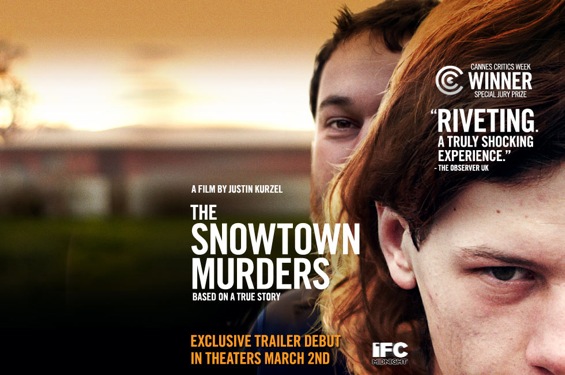
You’ve said that your next project will be a black comedy. Are there any status updates on that?
Yeah, I’ve just written a film called Ivan Lendl Never Learned to Volley, which is a black comedy about obsessive kind of parents – they kind of live their lives through their children. And it’s kind of based on a true story and also our background – the background [of] my brother [Jed] and I. It’s sort of [about] junior tennis players. We’ve already written the first draft and we’ll work on the next draft this year, but that’s something [I hope] to make in the future.
The Snowtown Murders is now in limited release.

